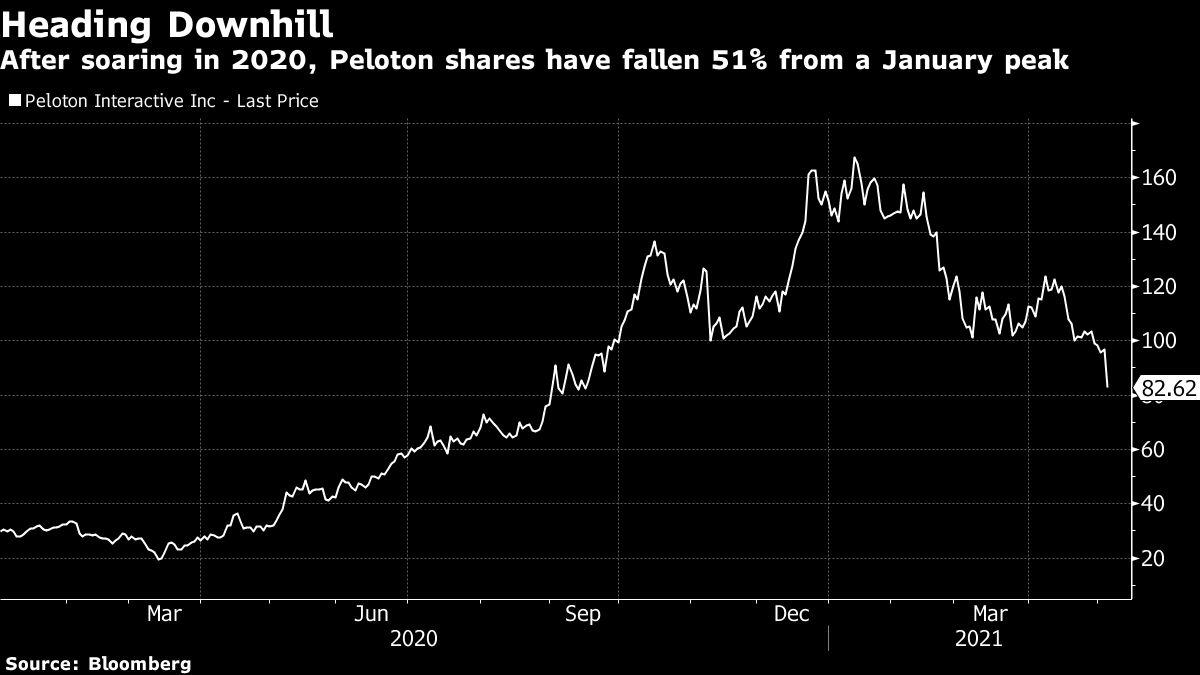Peloton Recall Tests Analyst Devotion as Stock Slump Deepens

(Bloomberg) — Peloton Interactive Inc.’s earnings report on Thursday was supposed to be the company’s chance to show off faster product deliveries. Instead, the equipment-maker finds itself in a tight spot over treadmill recalls that has investors second-guessing their devotion to a foundering stock.
After weeks of pushing back against U.S. regulator warnings about Peloton’s treadmills following the death of a child and other safety incidents, the recall jarred traders and even prompted a rebuke from a senator. The stock sank 15%, the most in six months, as investors considered the costs in addition to potential knock-on effects that could threaten sales growth.
“This may have other unquantifiable impacts to long-term demand,” said Ed Yruma, a KeyBanc analyst. Yruma, who has a buy-equivalent rating, said he would be re-evaluating his financial projections after Peloton’s earnings call on Thursday afternoon.
Investors’ love affair with Peloton was already strained before the recalls.
Shares of the the New York-based company had fallen 36% this year as it struggled with extended delivery times and the easing of Covid-related lockdowns raised concerns about sales growth in coming quarters.
The stock is now the worst performer in the Nasdaq 100 Stock Index after soaring more than fivefold in 2020. Still, of the 29 analysts tracked by Bloomberg that cover Peloton, all but five were recommending investors buy the stock ahead of Wednesday’s news. Wall Street’s optimism combined with sinking shares have pushed the gap between analyst targets and the stock price to 90%, the widest margin since Peloton’s 2019 market debut.
Peloton’s predicament is reminiscent of those endured by other consumer-facing companies that were hit with blows to their reputations at a time they were enjoying a honeymoon with Wall Street analysts. Usually, the path to recovery is neither swift nor sure.
After Chipotle Mexican Grill Inc. grappled with diners being sickened by food-borne illnesses, the stock needed almost four years to retrace the highs touched in 2015. Lululemon lost some of its halo last decade after complaints about the fabric quality in yoga pants — a situation worsened when the company founder suggested in 2013 that the gripes arose because the clothes just didn’t work “for some women’s bodies.” That stock took about six years to climb back into record territory.
Prior to the recall, Peloton bulls had been banking on a strong earnings report as a potential rally starter, with expectations for progress in fixing shipping delays after the company pledged to spend more than $100 million to improve delivery times. The focus has now shifted to details about the recall, including costs, how Peloton plans to implement fixes and the fate of its new treadmill model that was set to debut in the U.S. later this month.
In earnings calls with analysts over the past several months, Peloton executives touted how the cheaper Tread model beat sales expectations in the U.K., saying that it could eventually be a “rocket ship” for the company. The treadmill opportunity was potentially larger than bikes, they said, and expected its impact to be larger in fiscal 2022.
Long-Term Commitment
In spite of a near term hit to the company’s bottom line and potentially to its reputation amid the likelihiood for more lawsuits, most analysts are still positive on Peloton’s ability to maintain a rapid pace of revenue expansion. As of late afternoon Wednesday, Peloton got only one downgrade, a cut to neutral from buy, at Bank of America.
“We acknowledge that this recall will likely result in significant near-term one time financial costs and operational disruption, with potential reputational damage,” said Truist analyst Youssef Squali, who has a buy rating.
While Squali anticipates the new treadmill release will probably be delayed, he estimates that treadmill sales account for less than 10% of Peloton’s revenue and said the company’s long-term growth prospects remain intact.
Peloton’s “long-term standing (after it puts this issue behind it) and opportunity within this massive segment remain strong,” he wrote in a research note on Wednesday.
What Bloomberg Intelligence said:
The recall could lead to a financial impact of $550-$600 million, assuming a 100% recall rate. The near-term hit on growth may not be significant, as we calculate more than 90% of its hardware revenue comes from bikes.
– Amine Bensaid, BI analyst
(Adds details of other consumer product crises beginning in seventh paragraph.)
For more articles like this, please visit us at bloomberg.com
Subscribe now to stay ahead with the most trusted business news source.
©2021 Bloomberg L.P.



